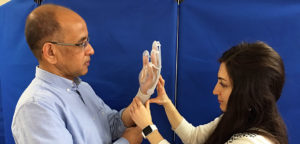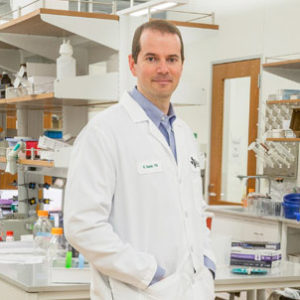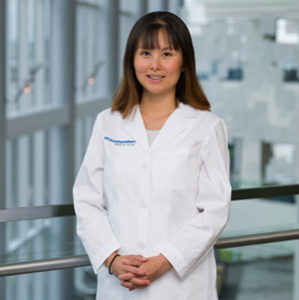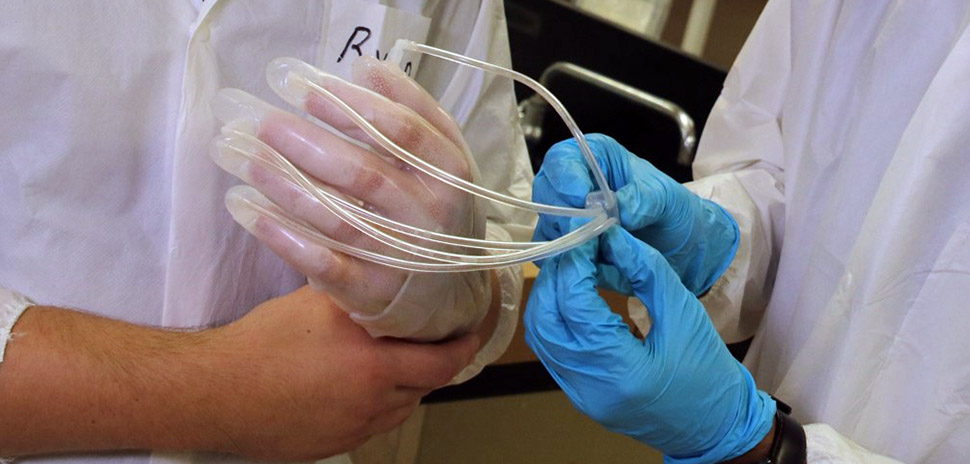![]() Every week, we do a little research of our own. We’re looking for scientists, professors, engineers, entrepreneurs—anybody, really—engaging in research and development across North Texas.
Every week, we do a little research of our own. We’re looking for scientists, professors, engineers, entrepreneurs—anybody, really—engaging in research and development across North Texas.
There’s plenty of good work being done. If you want to put R&D under your microscope, sign up for our e-newsletter.
UTA’s REHEAL Glove takes its next step toward commercialization
The healing glove is one step closer toward commercialization, after researchers at the University of Texas at Arlington Research Institute (UTARI) and the University of Washington said the REHEAL Glove team and REHEAL LLC had successfully developed a manufacturing process for the revolutionary bio-engineered healing aid.

Muthu Wijesundara, left, models a REHEAL Glove. [Photo: Courtesy UTA]
Development of the process was fueled by a $227,000 award from the Medical Technology Enterprise Consortium (MTEC), awarded in October 2017.
According to UT Arlington, the MTEC agreement paid for the development of this low-volume manufacturing process that created 100 flexible polymeric gloves for early stage clinical trials.
That success earned UTA the MTEC Prototype of the Year Acceleration Award in March at the consortium’s fourth annual membership meeting. It’s an award given to a project that advances a novel prototype technology to its next major milestone in a 12-month period.
The REHEAL Glove is a flexible glove wound dressing to treat hand trauma that provides negative pressure wound therapy. It allows early motion therapy during healing to reduce scarring that prevents irreversible joint stiffness.
The glove provides a way to deliver therapeutics and control the wound environment for better, faster healing.
A UT Dallas study is looking at why women get hit most by migraines
Migraine is three times more common in women than in men. Why is that?

Dr. Greg Dussor [Photo: Courtesy UT Dallas]
A new pre-clinical study from University of Texas at Dallas researchers may have the answer.
According to research published in The Journal of Neuroscience, a protein linked to the development of migraine symptoms caused pain responses in female rodents, but not in males, when introduced into the meninges, the protective tissue layers surrounding the brain.
Female rodents weren’t used in most previous pre-clinical investigations of migraine and the protein calcitonin gene-related peptide (CGRP)—just males.
“This is the first study to show that CGRP might act differently between sexes,” said Greg Dussor, the corresponding author of the study and an associate professor of neuroscience in the UTD School of Behavioral and Brain Sciences. “It also shows that CGRP can have a pain-related effect in the meninges, which is something that has been questioned in the literature previously.”
Cancer patients often add alternative medications, practices to treatment
Many patients with cancer diagnoses often find alternative medications and practices to their traditional medicine treatments, according to UT Southwestern Medical Center.

Dr. Nina Sanford [Photo: Courtesy UT Southwestern]
The alternatives include meditation, yoga, acupuncture, herbal medicine, and supplements.
UT Southwestern said a discovery by Dr. Nina Sanford, assistant professor of radiation oncology, is drawing renewed attention to habits she said cancer patients must disclose during treatment. She specializes in and treats cancers of the gastrointestinal tract.
Herbal supplements, followed by alternative medicine and chiropractic, or osteopathic manipulation, is most common, according to her analysis of data from the Centers for Disease Control and Prevention’s National Health Interview Survey. Sanford published her findings in the journal JAMA Oncology.
“Younger patients are more likely to use complementary and alternative medicines and women were more likely to, but I would have thought more people would tell their doctors,” Sanford said, referring to the 29 percent of people who use complementary and alternative medicine but don’t tell their physicians.
Find out more about Sanford’s work in this report by Patrick McGee.
Kanarys and UT Austin partner to research workplace diversity, equity, inclusion
Kanarys Inc., the Dallas data-driven technology platform, and the University of Texas at Austin’s Division of Diversity and Community Engagement (DDCE) have announced a joint research partnership that focuses on workplace diversity, equity, and inclusion.
Kanarys’ platform is aimed at fostering collaboration between companies and employees on those very issues. The startup will work closely with the DDCE to analyze anonymous employee feedback, surveys and insights gathered on its platform to compile critical research and trends on workplace diversity and inclusion initiatives.
“Companies have historically focused on diversity but not as much on inclusion. With this research partnership, we collectively aim to transform America’s workplaces so that they are truly diverse, equitable and inclusive to all,” Kanarys CEO and co-founder Mandy Price said in a statement.
UT students will benefit from this unique opportunity.
“The partnership with Kanarys will give our graduate students access to an enormous amount of data that can be analyzed numerous ways to assess how inclusive organizations really are,” Leonard Moore, vice president for diversity and community engagement at UT Austin, said in a statement. “Students from a variety of disciplines will have the chance to work with Kanarys analysts to help impact corporate cultures beyond those that partner with Kanarys. It provides the type of corporate exposure many don’t get to experience until after graduation while also getting the opportunity to work on more scholarly papers and reports.”
It’s more big news for Kanarys, which recently closed a $575,000 pre-seed funding round that the company said was necessary to lay the groundwork to launch the platform and add data analyst and AI/machine learning talent to the team.
READ NEXT
![]()
Get on the list.
Dallas Innovates, every day.
Sign up to keep your eye on what’s new and next in Dallas-Fort Worth, every day.




























